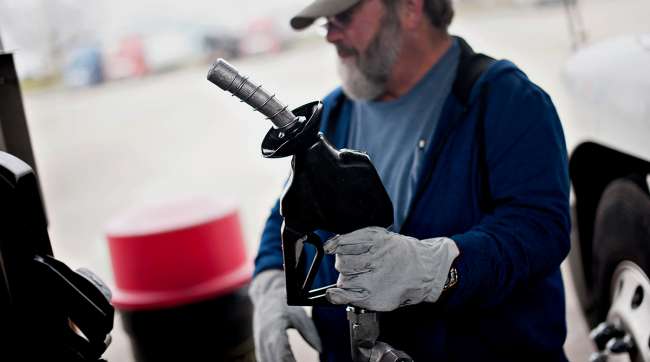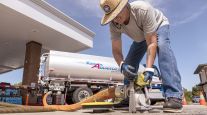California Truckers to Pay 20¢ More a Gallon for Diesel Starting Nov. 1

Beginning Nov. 1, drivers across California can expect to pay an extra 12 cents per gallon for gasoline at the pump, and an extra 20 cents per gallon for diesel.
The new gas tax, approved by the legislature and signed by the governor in April, is expected to raise roughly $5.4 billion annually over the next decade. About half of the money will go to the state to improve highways, bridges and culverts. The other half will go to cities, counties and transit agencies for local street and road repairs, and improving public transit options.
RELATED: Diesel climbs 2.2¢ to $2.819 a gallon, highest price in more than two years
But, there’s also some money in the bill for congestion relief, bicycle and pedestrian infrastructure and transportation research, workforce training and planning efforts.
At the A & A Gas and Mart station in downtown Oakland on Oct, 30, most drivers were unaware of the increase, expressing surprise and sticker shock at the 12-cent increase.
“Wow, really?” said Kai Yu, who drives throughout the East Bay and South Bay for his job installing sprinkler systems. He fills up the tank in his work van usually three times each week, he says.
“What can you do though?” he said. “I guess I’ll just pay it like everyone else.”
But, he says, he’s willing to pay if it will improve the roads.
“Especially in Oakland, the roads are really bad,” he added.
RELATED: California GOP rallies around measure to repeal new state gas tax
The state hasn’t raised the gas tax since 1994. Over time, inflation, coupled with increasing fuel efficiency of cars, has contributed to a massive backlog of deferred maintenance for both state and local infrastructure, said Julie Pierce, a Clayton City Council member. Pierce also serves on the Contra Costa Transportation Authority, which oversees transportation planning in the county, and the Metropolitan Transportation Authority, a Bay Area-wide transportation planning agency.
“The wear and tear on the roads is increasing, while the money to repair and maintain them is decreasing,” Pierce said. “(The tax) is really going to help all of us in local government do the maintenance of streets and roads that we haven’t been able to get the money for.”
Already, Caltrans has accelerated several dozen projects statewide, totaling just under $1 billion in existing or planned work, in anticipation of receiving the gas tax funds. But the measure has its detractors.
Already two ballot initiatives have been filed to repeal the tax. Assemblyman Travis Allen, (R-Huntington Beach), led the charge in June to launch a repeal effort. And former San Diego City Council member Carl DeMaio filed a second ballot initiative in September. Both still need to gather the requisite signatures to be placed on the ballot.
In an interview, Allen blasted Gov. Jerry Brown for passing the tax without voter approval. The state should be using existing revenue for the road repair and maintenance, rather than asking taxpayers to bail them out, he said.
RELATED: With California’s new gas tax approved, Caltrans is on a hiring spree as construction work ramps up
“This tax hits the poorest and hardworking Californians the most,” Allen said. “The repeal very simply puts the power back where it belongs — in the hands of the people of California and actually gives them the power to decide if they want the tax.”
A 2015 UC Berkeley survey of more than 1,000 voters bolsters Allen’s argument. Overall, the survey found 63% of voters opposed any new gas tax and 74% opposed higher vehicle registration fees. As part of the bill passed by the legislature in April, car owners will start paying new vehicle registration fees beginning Jan. 1, with fees increasing by $50 for cars valued under $25,000, or $175 for the highest-end luxury vehicles. Cars valued under $5,000 will pay $25 more. Electric vehicles will see an additional $100 fee starting in 2020.
A number of counties have had success in recent years passing their own taxes to support transportation improvements, including Alameda, Contra Costa, Santa Clara and San Francisco counties. Other local measures, such as the BART’s $3.5 billion bond measure or Oakland’s $600 million bond initiative, both of which were approved by voters last year, suggest commuters are tired of crumbling infrastructure, said Roger Dickenson, the executive director of Transportation California, an advocacy organization consisting of highway contractors, businesses, associations, major trade labor organizations and other groups invested in the transportation industry.
“As people understand this money is coming right back into their communities to reduce their costs and improve and maintain transportation systems, they believe the investment is worth it,” he said. “Nobody is arguing our transportation systems are not in dire need of attention.”
Distributed by Tribune Content Agency, LLC




